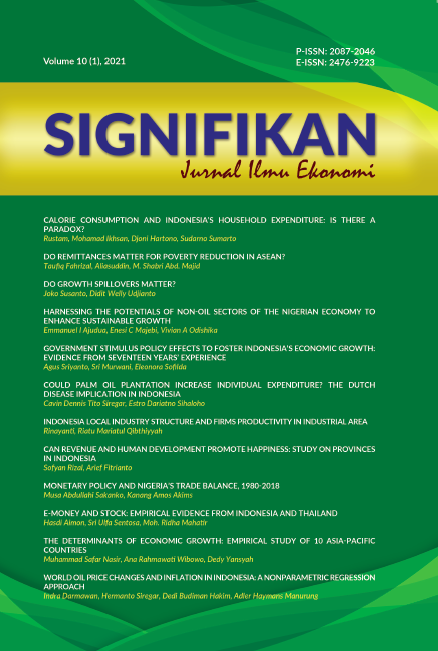Harnessing The Potentials of Non-Oil Sectors of The Nigerian Economy to Enhance Sustainable Growth
DOI:
https://doi.org/10.15408/sjie.v10i1.18493Keywords:
non-oil sector, agriculture, manufacturing, tourism, sustainable growth, GDPAbstract
In the face of global oil price instability, which seems to negatively impact the Nigerian economy, this study examined how the Nigerian government and its stakeholders have explored other sectors of her economy, such as agriculture, manufacturing, and tourism, enhancing sustainable growth. In achieving this, the study employed a time series data covering 24 years (1995-2018). The variables used in the study were real gross domestic product (RGDP), tourism share of GDP, agriculture share of GDP, and manufacturing share of GDP. The unit root test using the Augmented Dickey-Fuller test was conducted to test for stationarity among variables employed. The Autoregressive Distributive Lag Bound Test for Co-integration was also employed, while the ECM was also conducted to check for the speed of adjustment.The study findings revealed that, while the Nigerian government and industry stakeholders have made significant investments in the agriculture sector through the development of improved seedlings and farm infrastructure, there is a need for more investment in the manufacturing and tourism sectors of the nation's economy to boost her gross domestic product.
JEL Classification: O13, O14, Q01, Z32
How to Cite:
Ajudua, E. I., Majebi, E. C., & Odishika, V. A. (2021). Harnessing The Potentials of Non-Oil Sectors of The Nigerian Economy to Enhance Sustainable Growth. Signifikan: Jurnal Ilmu Ekonomi, 10(1), 51-62. https://doi.org/10.15408/sjie.v10i1.18493.
References
Ameh, E. (2009). Oil Price slump and imperative of diversifying the Economy. Business Day Online 12 January 2009. Retrieved from http://www.businessonline.com accessed on 16/12/201
Anyaehie, M. C., & Areji, A. C. (2015). Economic Diversification for Sustainable Development in Nigeria. Open Journal of Political Science, 5(2), 87-94.
Awaritefe, O. (2004). Motivation and Other Considerations in Tourist Destination Choice: A Case Study of Nigeria. Tourism Geographies, 6(3), 303-330.
Awaritefe, O. D. (2007). Evaluating Tourism Resource Areas in Nigeria for Development. Tourism Review, 62(2), 37–45.
Bello, Y. O., & Bello, M. B. (2019). Destination Attributes and Domestic Tourists' Choice of Obudu Mountain Resort Calabar. Ottoman: Journal of Tourism and Management Research, 4(3), 515-533.
Chukwuma, O. M. (2018). Diversification of Nigeria's Economic Through Agriculture and Solid Minerals in the Face of Dwindling Economic. International Journal of Advanced Research and Innovation, 6(3),147-151.
Eko, S. A., Utting, C. A., & Onun, E. U. (2013). Beyond Oil: Dual-Imperatives for Diversifying the Nigerian Economy. Journal of Management and Strategy, 4(3),81-93.
Elliot, G., Rothenberg, T. J., & Stock, J. H. (1996). Efficient Tests for an Autoregressive Unit Root. Econometrica, 64(4), 813-836.
Esu, G. E., & Udonwa, U. (2015). Economic Diversification and Economic Growth: Evidence from Nigeria. Journal of Economics and Sustainable Development, 6(16),56-68.
Iheonu, C., & Urama, N. E. (2019). Addressing Poverty Challenges in Nigeria. Retrieved from https://www.africaportal.org/publications/addressing-poverty-challenges-nigeria/
Ikon, M. A. (2019). Economic Diversification and Industrial Growth in Nigeria. Journal of Research in Business, Economics, and Management, 13(1), 2408-2415.
International Monetary Fund [IMF]. (2020). IMF Staff Concludes Article IV Consultation to Nigeria, February 17, 2020, Press Release No. 20/53.
Kemi, A. O. (2016). Diversification of Nigeria Economy Through Agricultural Production. IOSR Journal of Economics and Finance, 7(6),104-107.
Majebi, E. (2020). An Investigation of Stakeholders’ Strategies for External Crisis Preparedness: Perspectives of Tourism Industry Stakeholder in Jos, Plateau State, Nigeria. Fudma Journal of Sciences, 4(4), 144-154.
Muttaka, M. (2015). The Intrigues of Nigeria's Diversification Strategy. Retrieved from: http://www.dailytrust.com.ng/daily/business/43325-the-intrigues-of-nigeria-sdiversification-Strategy.
Nkoro, E., & Uko, A. K. (2016). Autoregressive Distributed Lag (ARDL) Cointegration Technique: Application and Interpretation. Journal of Statistical and Econometric Methods, 5(4), 63-91.
Odupitan, E. (2017). Effects of Crashing Crude Oil Prices on Oil Producing Countries: Nigeria's Perspective. (Unpublished Thesis). Centria University of Applied Sciences, Finland
Pesaran, M. H., Shin, Y., & Smith, R. J. (2001). Bounds Testing Approaches to The Analysis of Level Relationships. Journal of Applied Econometrics, 16(3), 289-326.
Riti, J. S., Gubak, H. D., & Madina, D. A. (2016). Growth of Non-Oil Sectors: A Key to Diversification and Economic Performance in Nigeria. Public Policy and Administration Research, 6(3), 64-75.
Suberu O. J., Ajala O. A., Akande M. O., & Olure-Bank A. (2015). Diversification of the Nigerian Economy towards a Sustainable Growth and Economic Development. International Journal of Economics, Finance and Management Sciences, 3(2),107-114.
Tonuchi, J. E., & Onyebuchi, N. A. (2019). Economic diversification in Nigeria: The Role of Agriculture and Manufacturing Sector. International Journal of Electrical and Computer Engineering, 7(3), 916-926.
Uma, K., Obidike, P., Chukwu, C., Kanu, C., Ogbuagu, R., Osunkwo, F., & Ndubuisi, P. (2019). Revamping the Nigerian Manufacturing Sub-Sector as a Panacea for Economic Progress: Lessons from South Korea. Mediterranean Journal of Social Sciences, 10(4), 111-123.
Wole, O. (2018). Why Nigerian Tourism Sector Lags amid Huge Potential. The Guardian Nigeria Newspaper - Nigeria and World News, 12 September [Online blog]. Retrieved from: <https://guardian.ng/features/why-nigerian-tourism-sector-lags-behind-amid-huge-potential/> [Accessed 30 December 2018].
Yusuff, M. A., & Akinde, M. A. (2015). Tourism Development and Economic Growth Nexus: Nigeria’s Experience. European Journal of Hospitality and Tourism Research, 3(4), 1-10.

